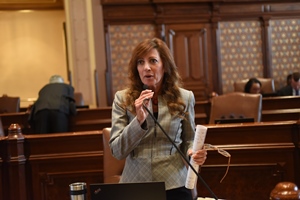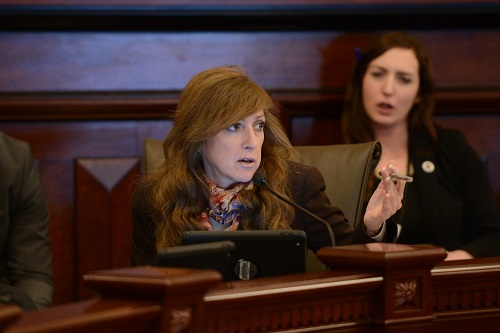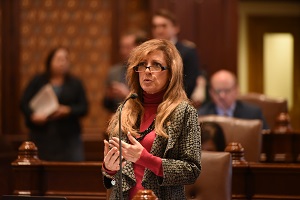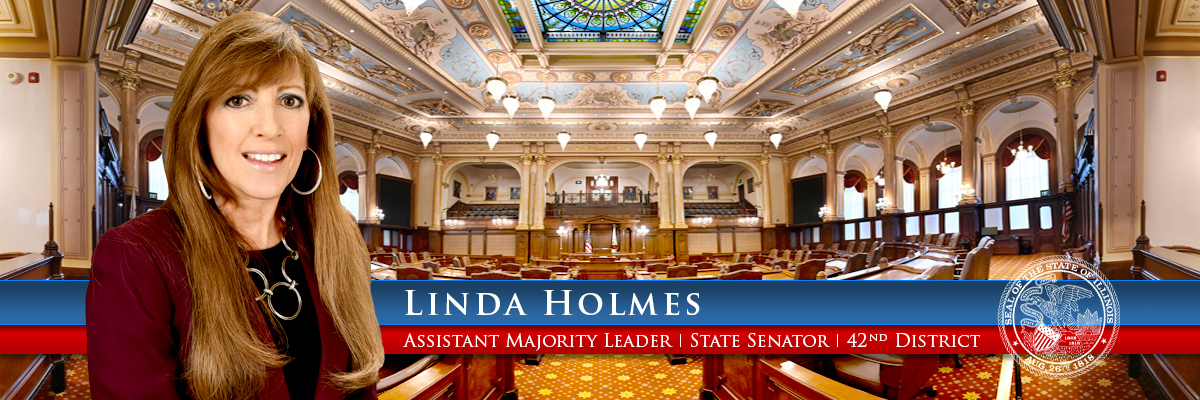Holmes proposal to expand HPV prevention passes Senate
- Details
- Category: News
 SPRINGFIELD – To improve access to information about human papillomavirus (HPV) for young people in Illinois, State Senator Linda Holmes (D-Aurora) passed legislation through the Illinois Senate earlier today.
SPRINGFIELD – To improve access to information about human papillomavirus (HPV) for young people in Illinois, State Senator Linda Holmes (D-Aurora) passed legislation through the Illinois Senate earlier today.
Holmes’ measure, Senate Bill 2866, requires doctors to inform both male and female students entering the sixth grade about the HPV vaccine. Since 2007, state law has only required female students receive this information. The Center for Disease Control has recommended the vaccination for males since 2011.
“Each year, HPV causes 30,700 cancer diagnoses in both men and women,” Holmes said. “Updating our laws to ensure male students and their parents are able to make an informed decision about receiving the HPV vaccine will ultimately save lives.”
Senator Holmes’ proposal passed the Illinois Senate with a vote of 54-0-1. It will now be considered by the Illinois House of Representatives.

Aurora schools to receive over $20 million in new funding
- Details
- Category: Latest
AURORA – Aurora schools will receive over $20 million in new funding thanks to the school funding formula overhaul supported by State Senator Linda Holmes (D-Aurora). Last week, the Illinois State Board of Education issued funds under the new formula to school districts around the state.
The distribution is based on detailed enrollment figures, district-specific student learning needs, the availability of local resources and other data. Intended as a first step toward fairer state support for every school district, the formula ensures no schools will ever receive less state funding than they do today under the new plan.
“Aurora school districts will see some of the largest increases in state funding, allowing them to correct inequalities caused by Illinois’ old, unfair funding model,” Holmes said. “For far too long, a student’s ZIP code has dictated the quality of education that he or she will receive. I look forward to seeing this trend reversed as Illinois dedicates more resources to its schools.”
Under the new formula, over $20 million in new, additional funding from the state will be sent to school districts serving Aurora. Aurora East Unit School District 131 will receive over $12.6 million, one of the largest funding increases in the state. Aurora West Unit School District 129 will receive $6.4 million and Indian Prairie School District 204 will receive over $700,000.
Sen. Holmes responds to veto of education local control measure
- Details
- Category: New Releases
SPRINGFIELD – State Sen. Linda Holmes (D-Aurora) released the following statement in response to the governor’s veto of her measure House Bill 768, which allows local school boards to make the final decision when issuing, denying or revoking charter school licenses:
“Governor Rauner wants to deny local officials the right to decide who educates their communities. By vetoing this bipartisan measure, Rauner keeps charter school permitting decision-making at the state level, where he can more easily influence outcomes and force communities to support charter schools that they may not need or want. School boards across the state know what is best for those that they serve and should have the final word on issuing, denying or revoking a charter school permit.”

Sen. Holmes introduces measure to expand HPV prevention efforts
- Details
- Category: Latest
SPRINGFIELD – To improve access to information about human papillomavirus (HPV) for young people in Illinois, state Sen. Linda Holmes (D-Aurora) introduced legislation in a Senate committee meeting.
“This legislation ensures that all sixth-grade students in Illinois receive information about the HPV vaccine and its importance in preventing dangerous illnesses later in life,” Holmes said. “Since 2007, only girls have received information about the vaccine. If we want to decrease cases of HPV and associated conditions like cervical cancer, we need to do a better job of educating younger generations.”
Holmes’ legislation requires students entering sixth grade to be given information about the HPV vaccine from a doctor. Starting in 2007, state law began requiring only female students to receive this information. The Centers for Disease Control has recommended and approved the vaccination for males since 2011.
“Annually, HPV causes 30,700 cancer diagnoses in both men and women,” Holmes said. “Updating the law to include boys will raise awareness about the vaccination and ensure that it is administered around age 11 or 12, when the immune response is best. This legislation does not require anyone to be vaccinated, but it will give more information to all students and their families, saving lives down the road.”
The legislation, Senate Bill 2866, was approved by the Senate Public Health Committee. It awaits consideration by the full Senate.
More Articles …
Page 64 of 86




